Boiler Installation Rothwell
Top 10 Boiler Installation in Rothwell
Get multiple Boiler Installation quotes for your project today! Compare profiles, reviews, accreditations, portfolio, etc... and choose the best service.

Acute Heating
19-21 Somers St, Leeds, LS1 2RG, GBAcute Heating is a leading provider of commercial and residential gas, heating, and boiler services across the UK. With over 20 years of experience, our team of highly skilled professionals is dedicated to delivering exceptional customer service, fast response times, and affordable rates. We specialize in installation, maintenance, and repair services for a wide range of heating systems, including boilers, water heaters, and commercial heating pumps. Acute Heating prides itself on utilizing the latest digital technology to modernize how you stay safe and warm. We work with both homes and businesses, ensuring your vital systems run smoothly 24/7. Contact us today for a free quote and experience the Acute Heating difference.
- Services
- Why Us?
- Testimonials
- Gallery
Get Quote
Efficient Heating Solutions
4.637 reviews25 Woodlea Grove, Meanwood, LS6 4SJ, GBLooking for a new boiler? Get in touch today to find out more. Looking for trustworthy and reliable heating engineers? We offer you the highest quality and workmanship. During our years in business we have built up an excellent reputation for our quality of work and professional, friendly and efficient service. Fully insured, Worcester Accredited and Gas Safe Registered our company has developed its reputation by offering customer satisfaction and value for money, whilst our respect for the environment sets us apart from our competitors. Established in 2005 and managed by Phill Whittaker, a qualified and accredited gas engineer with 20 years experience, we have the knowledge and expertise needed to ensure that you receive nothing but the best service. We are committed to exploring the latest technology to reduce your heating bills and can install all models of smart controls. We are proud to be an accredited Honeywell evohome installer, a sophisticated system that lets you individually control up to 12 heating zones in your home. Servicing Leeds and the surrounding areas, we endeavour to minimise our impact on the environment by installing high efficiency products that will significantly cut your home's CO2 emissions. Whether you are a private customer looking for a personal service or a landlord looking for someone to manage your complete heating requirements then Efficient Heating Solutions can deliver what you need. You can rest assured we will tidy up after ourselves and always treat your home with care.
- Services
- Why Us?
- Accreditations
- Our Team
- Gallery
Get Quote
AC Heating PLC Emergency Boiler Repair Middleton
4.58 reviews66a Middleton Park Rd, Middleton, LS10 3SA, GBAC Heating PLC Emergency Boiler Repair Middleton is a family run plumbing business, providing Middleton area with a friendly professional service for all your plumbing and boiler repair requirements. Our 24 hour emergency plumber Middleton. We specialize in all types of Plumbing services including Emergency Plumbing call outs, Boiler Repair, Boiler installation, Boiler servicing and full heating installations. AC Heating PLC Emergency Boiler Repair Middleton repair pride ourselves as being one of the area’s premier 24 hour emergency Plumbing companies. When a problem occurs that requires an immediate response we offer complete solutions including Boiler repairs and waterleak repairs throughout Middleton 24 hours a day, 365 days a year. Highly skilled local Plumbers are on standby with fully equipped vans containing all the necessary equipment to carry out any Plumbing service. With our local Middleton engineers you know you’re in safe hands. We have had many recommendations through word of mouth. This is due to our policy of putting customer satisfaction as well as safety, above all else. Please contact one of are friendly office staff now to book a appointment.
- Services
- Why Us?
- Accreditations
- Gallery
Get Quote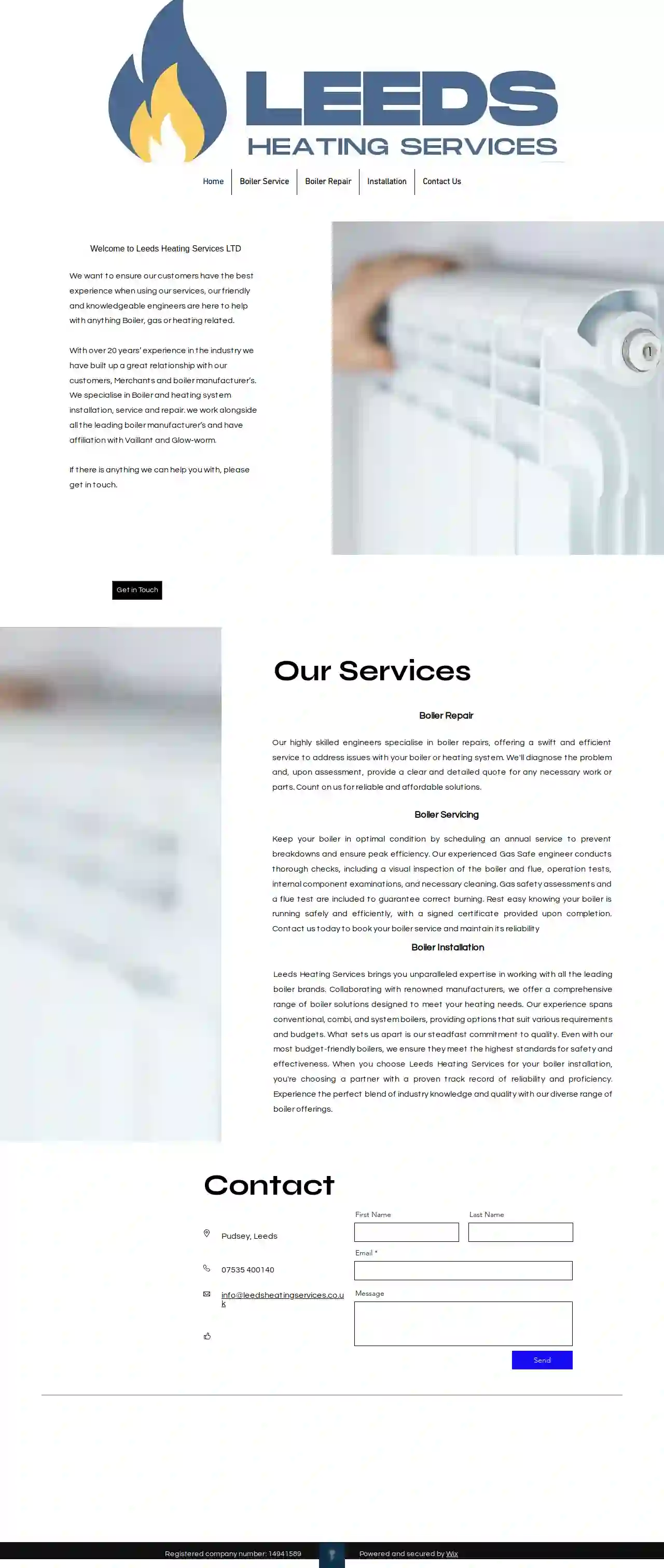
Leeds heating services ltd
53 reviewsPudsey, GBWelcome to Leeds Heating Services LTD. We want to ensure our customers have the best experience when using our services, our friendly and knowledgeable engineers are here to help with anything Boiler, gas or heating related. With over 20 years’ experience in the industry we have built up a great relationship with our customers, Merchants and boiler manufacturer’s. We specialise in Boiler and heating system installation, service and repair. we work alongside all the leading boiler manufacturer’s and have affiliation with Vaillant and Glow-worm. If there is anything we can help you with, please get in touch.
- Services
- Why Us?
- Gallery
Get Quote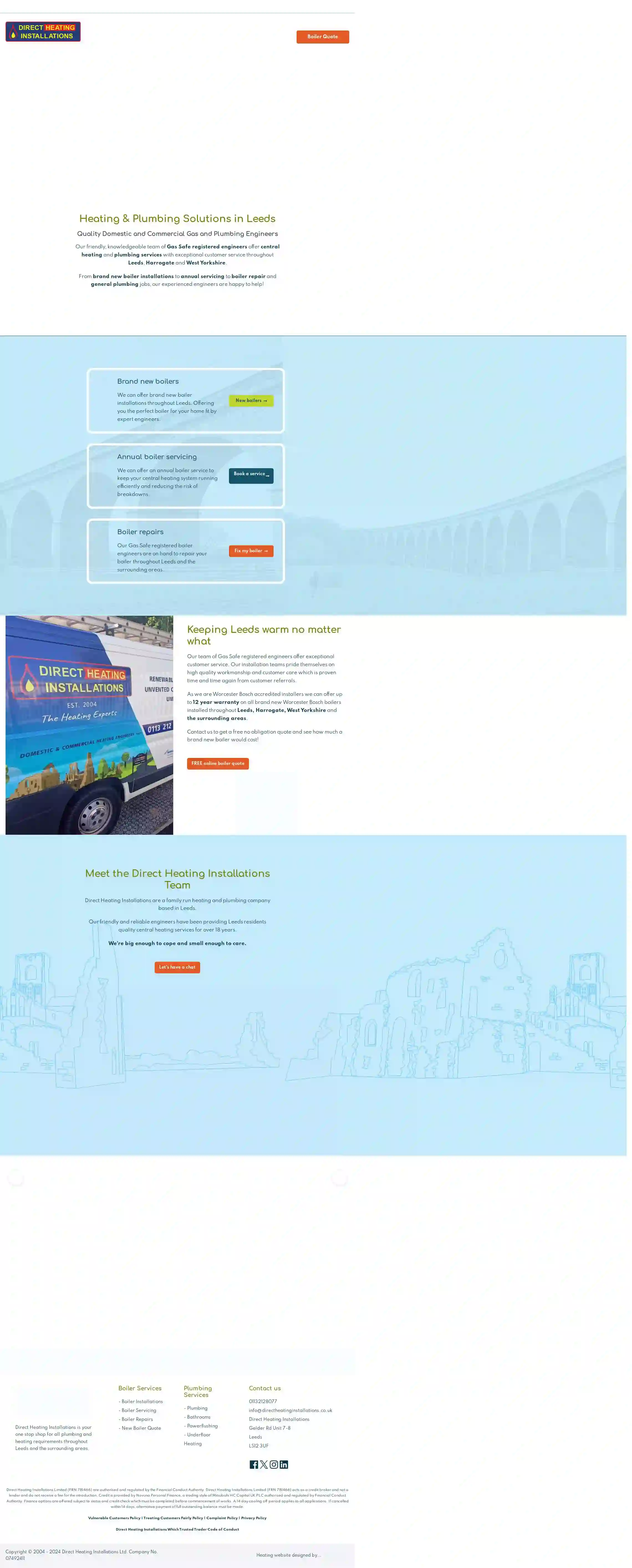
Direct Heating Installations
4.939 reviewsGelder Rd Unit 7-8, Leeds, LS12 3UF, GBDirect Heating Installations is a family-run heating and plumbing company based in Leeds, serving the Leeds, Harrogate, and West Yorkshire areas. With over 18 years of experience, their friendly and reliable Gas Safe registered engineers provide quality central heating services. They pride themselves on high-quality workmanship and customer care, as evidenced by numerous customer referrals. As Worcester Bosch accredited installers, they offer up to a 12-year warranty on new Worcester Bosch boilers. Direct Heating Installations offers a comprehensive range of services, including boiler installations, servicing, repairs, new boiler quotes, plumbing, bathrooms, powerflushing, and underfloor heating.
- Services
- Why Us?
- Accreditations
- Gallery
Get Quote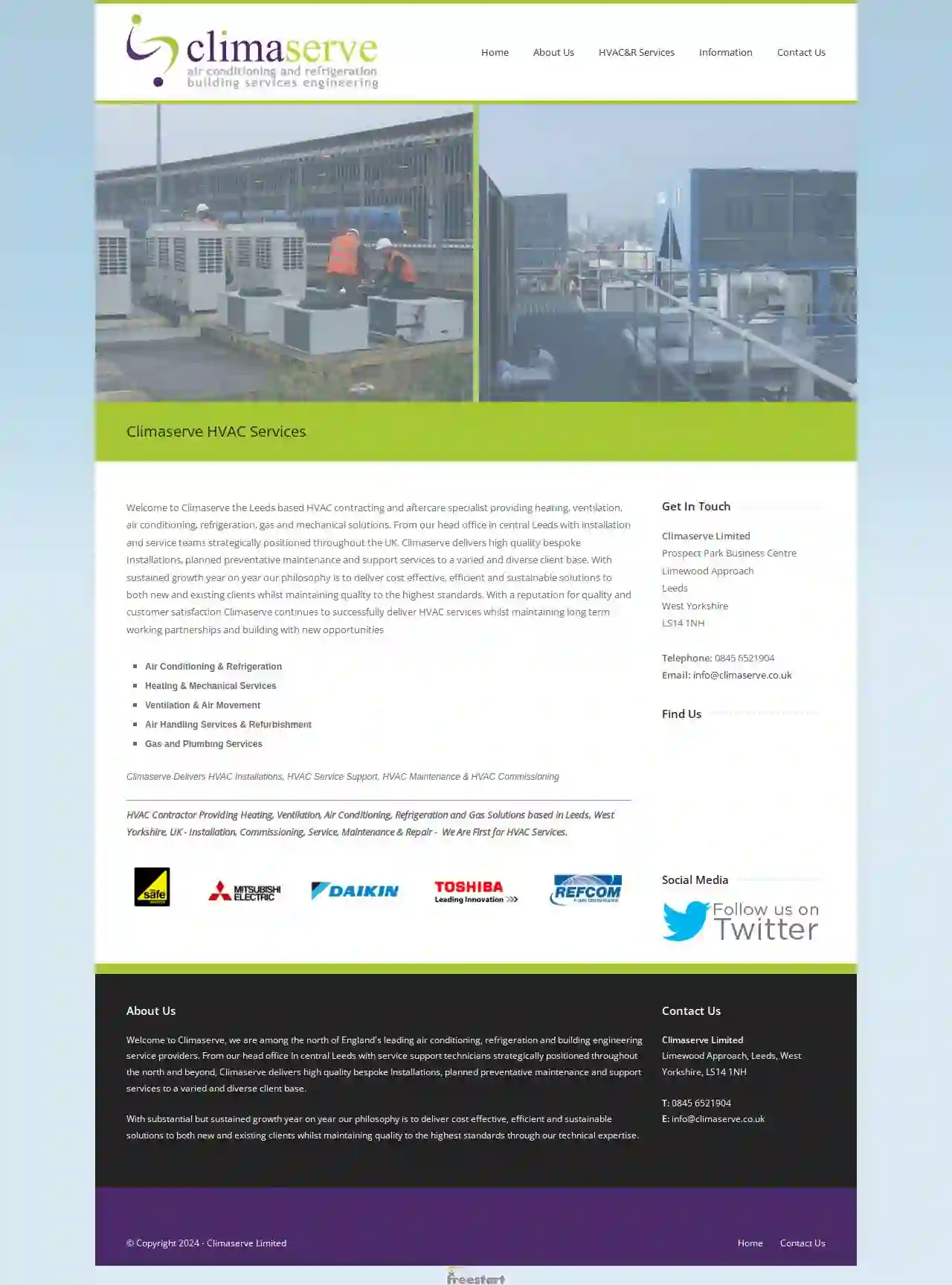
Climaserve Limited
3.73 reviewsProspect Park Business Centre, Limewood Approach, Leeds, LS14 1NH, GBWelcome to Climaserve, a Leeds-based HVAC contracting and aftercare specialist providing heating, ventilation, air conditioning, refrigeration, gas and mechanical solutions. From our head office in central Leeds with installation and service teams strategically positioned throughout the UK, Climaserve delivers high-quality bespoke installations, planned preventative maintenance and support services to a varied and diverse client base. With sustained growth year on year, our philosophy is to deliver cost-effective, efficient and sustainable solutions to both new and existing clients whilst maintaining quality to the highest standards. With a reputation for quality and customer satisfaction, Climaserve continues to successfully deliver HVAC services whilst maintaining long-term working partnerships and building with new opportunities.
- Services
- Why Us?
- Gallery
Get Quote
A Tech Installs LTD
510 reviewsLeeds, GBExpert Boiler Installation and Central Heating Services in Leeds. Your Trusted Source For Effortless, Hassle-Free Heating Solutions Book Your Engineer Now Local company quality workmanship free quotation No call out charge Welcome to A-Tech Installs, your trusted partner for expert boiler installation, servicing, and comprehensive heating solutions in Leeds and nearby areas. Our Gas Safe registered team specializes in delivering quality boiler solutions to keep your home warm and comfortable year-round. From new boiler installations to thorough servicing, we ensure your heating system operates at peak efficiency. With a focus on professionalism, reliability, and a customer-centric approach, we prioritize your safety and satisfaction in every job we undertake. In addition to our premier boiler services, we’re experts in gas works and general plumbing. Whether you require gas appliance installations, repairs, or various plumbing jobs, count on A-Tech Installs for honest and reliable service. Trust us for all your heating, gas, and plumbing needs, and experience warmth and peace of mind like never before. Contact us today to schedule your consultation and discover why A-Tech Installs is the preferred choice for boiler installation, servicing, and comprehensive home solutions in Leeds. Services We Provide boiler installation Considering replacing your old boiler or getting a new one? Opt for our premier installation services where quality meets affordability. Boilers with warranties of up to 18 years, installed by our expert team. Choose peace of mind and comfort for your home Click here boiler service Ensure your boiler’s longevity with our service options. We cover all major brands. Our expert team in Leeds prioritizes safety and efficiency for stress-free maintenance. Sign up now to unlock your boiler’s full potential. Click here boiler repair Facing a boiler emergency in Leeds? Count on A Tech Installs for swift solutions. Our Gas Safe registered engineers specialize in repairing all major brands, ensuring transparent pricing with fixed fees and quality assurance for a worry-free fix. Click here Central Heating Keep your home warm and welcoming with our expert central heating services. Issues with heating? We diagnose and fix all heating problems. We upgrade and install heating systems with efficient solutions. If your radiators aren’t warming up, our powerflushing service removes sludge and dirt, improving your heating system’s efficiency. Count on us to keep your central heating system running smoothly and your home warm and comfortable. Click here Gas Services Safe and sound expert gas services in Leeds. As a Gas Safe registered company, we serve homeowners and landlords, providing a comprehensive range of services from gas certificates to detecting gas leaks and servicing or installing gas appliances. We ensure all your gas appliances are running safely and efficiently. Trust us for all your gas needs. Get in touch today. Click here Plumbing Ensure your home’s plumbing’s sorted right with our quality services. From the smallest leaks to complete plumbing installations, we’ve got your back for all plumbing services and gas jobs. Our expert crew puts safety and efficiency at the forefront, offering easy solutions for installation, maintenance, and repairs. Sign up now to keep your plumbing running smooth. Click here Connect with A Tech Install LTD for reliable plumbing and central heating services in Leeds and West Yorkshire. Our expert team is just a call away to address all your needs promptly and efficiently. Whether it’s a minor plumbing repair, a boiler installation, or central heating maintenance, we’re here to help. Take the first step towards hassle-free solutions. Contact us now for quick, transparent, and professional service.
- Services
- Why Us?
- Gallery
Get Quote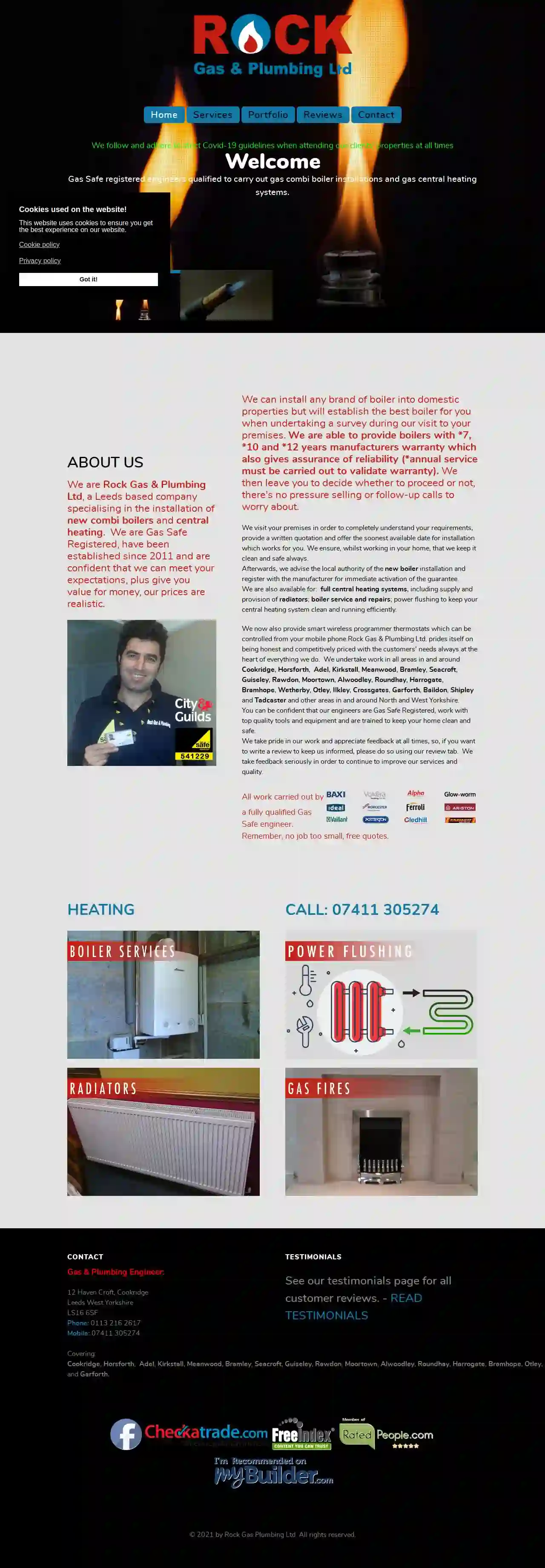
ROCK GAS & PLUMBING LTD
528 reviews12 Haven Croft, Leeds, LS16 6SF, GBWelcome to Rock Gas & Plumbing Ltd, a Leeds based company specialising in the installation of new combi boilers and central heating. We are Gas Safe Registered, have been established since 2011 and are confident that we can meet your expectations, plus give you value for money, our prices are realistic. We can install any brand of boiler into domestic properties but will establish the best boiler for you when undertaking a survey during our visit to your premises. We are able to provide boilers with *7, *10 and *12 years manufacturers warranty which also gives assurance of reliability (*annual service must be carried out to validate warranty). We then leave you to decide whether to proceed or not, there's no pressure selling or follow-up calls to worry about. We visit your premises in order to completely understand your requirements, provide a written quotation and offer the soonest available date for installation which works for you. We ensure, whilst working in your home, that we keep it clean and safe always. Afterwards, we advise the local authority of the new boiler installation and register with the manufacturer for immediate activation of the guarantee. We are also available for: full central heating systems, including supply and provision of radiators; boiler service and repairs; power flushing to keep your central heating system clean and running efficiently. We now also provide smart wireless programmer thermostats which can be controlled from your mobile phone. Rock Gas & Plumbing Ltd prides itself on being honest and competitively priced with the customers' needs always at the heart of everything we do. We undertake work in all areas in and around Cookridge, Horsforth, Adel, Kirkstall, Meanwood, Bramley, Seacroft, Guiseley, Rawdon, Moortown, Alwoodley, Roundhay, Harrogate, Bramhope, Wetherby, Otley, Ilkley, Crossgates, Garforth, Baildon, Shipley and Tadcaster and other areas in and around North and West Yorkshire.
- Services
- Why Us?
- Accreditations
- Our Team
- Testimonials
- Gallery
Get Quote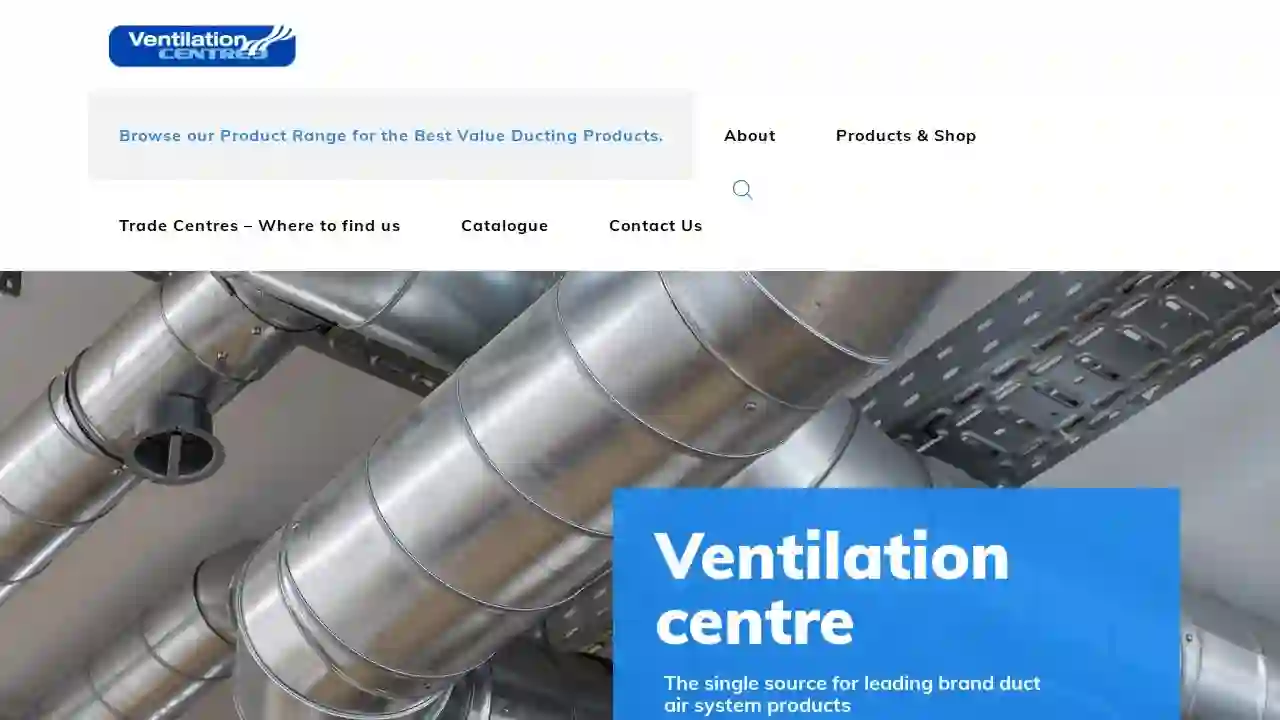
Ventilation Centre Ltd
11 reviews1000 Chester Road, Unit 10, The Business Centre, Birmingham, B37 7AA, GBVentilation Centre is a leading supplier of ventilation products and systems in the UK. We offer a wide range of solutions for both domestic and commercial applications, including air conditioning, heat recovery, and air purification. Our team of experts has over 20 years of experience in the industry and is dedicated to providing our customers with the highest quality products and services. We are committed to delivering innovative and sustainable solutions that meet the evolving needs of our clients. At Ventilation Centre, we understand the importance of good indoor air quality. Our products are designed to improve ventilation, reduce allergens, and create a healthier and more comfortable environment. We work closely with our customers to understand their specific requirements and provide tailored solutions that meet their individual needs. We are proud to be a trusted partner for businesses and homeowners alike. Our commitment to excellence has earned us a reputation for reliability, quality, and customer satisfaction. We are constantly striving to improve our products and services and to exceed the expectations of our clients.
- Services
- Why Us?
- Accreditations
- Our Team
- Testimonials
Get Quote
Linear Control Systems Ltd
3.85 reviewsLowfields Road, No 2, United Business Park, Leeds, LS12 6UB, GBLinear Control Systems Ltd has been a leading provider of Building Energy Management Systems (BEMS) since 2005. We specialize in designing, installing, and maintaining bespoke BEMS solutions that help our clients monitor and control their energy consumption and occupant comfort. Our mission is to deliver high-quality services at competitive prices, ensuring customer satisfaction through timeliness, attention to detail, and a service-minded approach. We combine cutting-edge building strategy and BMS knowledge to develop efficient and effective solutions that keep businesses ahead of the curve. We are committed to promoting a more sustainable future and helping our clients achieve lower operating costs through smarter energy usage, advanced building automation, and sophisticated monitoring.
- Services
- Why Us?
- Accreditations
- Our Team
- Testimonials
- Gallery
Get Quote
Over 12,692+ HVAC Contractors on our platform
Our HVAC pros operate in Rothwell and beyond!
HVACCompaniesHub has curated and vetted the Best HVAC Companies arround Rothwell. Find the most reliable contractor today.
Frequently Asked Questions About Boiler Installation
- Combi boilers: Combination boilers provide both heating and hot water instantly, eliminating the need for a separate water tank. . They are compact, efficient, and well-suited for smaller homes or apartments.
- Condensing boilers: Condensing boilers are one of the most efficient types of boiler. They extract more heat from the fuel by condensing the water vapor in the exhaust gases, thus saving energy. Because of increased efficiency, condensing units can help lower your carbon footprint and reduce heating costs.
- System boilers: System boilers are designed for larger homes and store domestic hot water in a separate cylinder. . They are a good option for homes requiring a higher volume of hot water.
- Regular boilers: Regular boilers, also known as conventional or traditional boilers, require a separate hot water cylinder, a cold water storage tank, and an expansion tank. They are suitable for larger properties with high hot water requirements and existing pipework.
- Upgrade to a high-efficiency condensing boiler: They reduce energy loss and lower your heating bills.
- Install a programmable thermostat: A programmable thermostat allows you to set different temperatures for different times of the day , helping you use less energy and save money.
- Insulate your home: Good insulation helps trap heat, keeping your house warm and reducing the amount of work your boiler needs to do. .
- Service your boiler annually: Regular servicing ensures your boiler is operating at optimal efficiency and safety.
- Powerflush your system: Over time, sludge and debris can build up in your heating system, reducing efficiency. A powerflush cleans the system, improving circulation and heat output.
What is a boiler's BTU rating?
What type of boiler is best?
How can I make my boiler more energy-efficient?
What is the average lifespan of a boiler?
What is a boiler's BTU rating?
What type of boiler is best?
- Combi boilers: Combination boilers provide both heating and hot water instantly, eliminating the need for a separate water tank. . They are compact, efficient, and well-suited for smaller homes or apartments.
- Condensing boilers: Condensing boilers are one of the most efficient types of boiler. They recycle heat from waste gases, improving energy efficiency. Condensing boilers offer long-term savings.
- System boilers: System boilers are designed for larger homes and store domestic hot water in a separate cylinder. . They are a good option for homes requiring a higher volume of hot water.
- Regular boilers: Regular boilers, also known as conventional or traditional boilers, are the most traditional type of boiler, and they generally require the most space. They are suitable for larger properties with high hot water requirements and existing pipework.
How can I make my boiler more energy-efficient?
- Upgrade to a high-efficiency condensing boiler: They reduce energy loss and lower your heating bills.
- Install a programmable thermostat: A programmable thermostat allows you to set different temperatures for different times of the day , helping you use less energy and save money.
- Insulate your home: Good insulation helps trap heat, keeping your house warm and reducing the amount of work your boiler needs to do. .
- Service your boiler annually: Regular servicing ensures your boiler is running as efficiently as possible. .
- Powerflush your system: Remove buildup that interferes with your system's performance. It also extends the lifespan of your boiler.